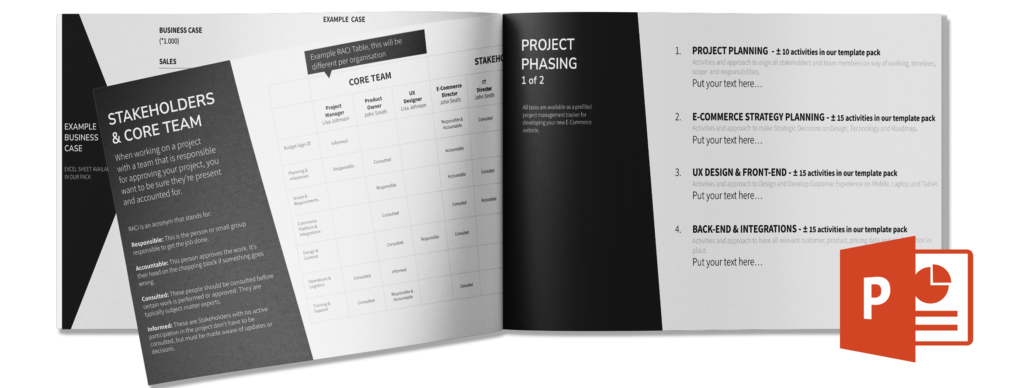Project management & a Projectplan is critical for the success of e-commerce projects for several reasons. Firstly, it helps ensure that the team is aligned with the business goals and delivers value to the client. By providing clear leadership and direction, project management ensures that the team is working towards the same objectives and that the project stays on track.
Secondly, project management facilitates smooth communication between the project team and the client, ensuring that everyone is on the same page and that any issues or challenges are addressed in a timely manner. This is especially important in e-commerce projects, where the impact of delays or problems can be significant.
Effective e-commerce project management involves focusing on the specific needs and characteristics of e-commerce activities, and requires a project manager to organize and motivate the team to meet deadlines, maintain quality standards, and complete the project within budget. Without proper e-commerce project management, it can be difficult for online retailers to stay competitive and attract organic traffic. By keeping up with market trends, collaborating with the right partners, and implementing cutting-edge technologies, e-commerce businesses can overcome common challenges and achieve their goals. Proper planning is key to effectively managing an e-commerce project and ensuring the success of the online store.

In addition, project management helps create a roadmap for executing the project and achieving business goals. It allows teams to plan and organize their work effectively, providing realistic estimates and ensuring that the project stays on schedule. By extracting learning from past projects, project management also helps teams identify and mitigate risks, improving the chances of project success. Overall, project management is essential for the smooth execution and delivery of e-commerce projects.
Before starting an e-commerce project, it’s important to have the following three things in place:
- Project Manager: This person will lead the project team and be responsible for overseeing research, planning, execution, and communication. It’s common for agencies to assign a senior team member as the project manager, rather than hiring a certified project manager. The Project Manager is also in the lead to make the Projectplan: check my free PowerPoint Projectplan.
- Project Management Methodology: The PM methodology determines how the project will be managed and delivered. Two common approaches are the Waterfall and Agile methodologies. It’s important to choose the right methodology for your project to ensure its success.
- Project Management Tool: A project management platform can help the project manager plan and track the project’s progress. There are many tools available, so it’s important to choose one that meets your needs and fits your budget. Some popular options include Jira, Notion and even basic Excel.
Methodologies
Project management methodologies are essential tools for organizing and executing projects effectively. There are several approaches that project management professionals have developed and refined over the years, each with its own strengths and best uses. Here are three of the most popular methodologies:
- Waterfall: The Waterfall approach is a linear process that involves gathering detailed requirements, creating a plan, building a solution, testing, and delivering the final product. It is a traditional approach that involves planning the entire project at the beginning and moving through each stage in a linear fashion. This method can be useful for small teams that want a clear vision of the final product, but it can be inefficient as no new stage can begin until the previous one is fully completed. This method works well when the project requirements are well-defined and clear.
- Agile: The Agile methodology is an iterative approach that involves breaking the project down into smaller, time-limited phases and delivering features incrementally. It is a highly effective approach to e-commerce project management that involves a team working together to deliver high-quality, ready-for-use products. It begins by discussing the main objectives and requirements of the client and using sprints to create and improve upon the product. Short meetings are held daily to review progress, discuss any issues, and plan tasks for the day. The importance of teamwork in the Scrum method means that it is essential for every team member to have adequate experience and be able to quickly respond to challenges. By following the Scrum method, e-commerce teams can effectively plan and execute projects to meet the needs of their clients and drive success for their business. This method is ideal for projects that require quick wins and can be developed in stages.
- Lean: Lean project management is an iterative approach that focuses on minimizing waste. The lean methodology aims to eliminate three types of waste: unnecessary activities, overburdened team members, and uneven workloads. In lean project management, the team starts by identifying the value that the project will deliver to the customer and then works to eliminate any unnecessary steps or activities that do not directly contribute to that value. This approach helps to streamline the project and ensure that resources are being used effectively. By following this approach, teams can streamline their work and deliver results more efficiently.

Project Management Tools & Tasks
Project management tools are essential for ensuring the success of any project. They provide a central platform for organizing and tracking tasks, communicating with team members and clients, and keeping everyone on track (Be sure to check out my Template Pack with all 70+ Tasks written out). Without a project management tool, it can be difficult to keep track of progress and make sure that everyone is working towards the same goals.
One of the key benefits of project management software is its ability to facilitate communication between team members and clients. As Capterra found, two out of three project teams use project management software to communicate with clients. This helps to keep everyone informed about the project’s progress and ensures that there are no misunderstandings or miscommunications.
When choosing a project management tool, it’s important to consider your budget and the specific needs of your team. Reliability, ease of use, and ease of integration are all important criteria to consider. It’s also a good idea to shortlist a few different options and try them out to see which one works best for your team. Ultimately, the best project management tool is the one that meets your needs and helps you to successfully complete your projects on time and within budget.


